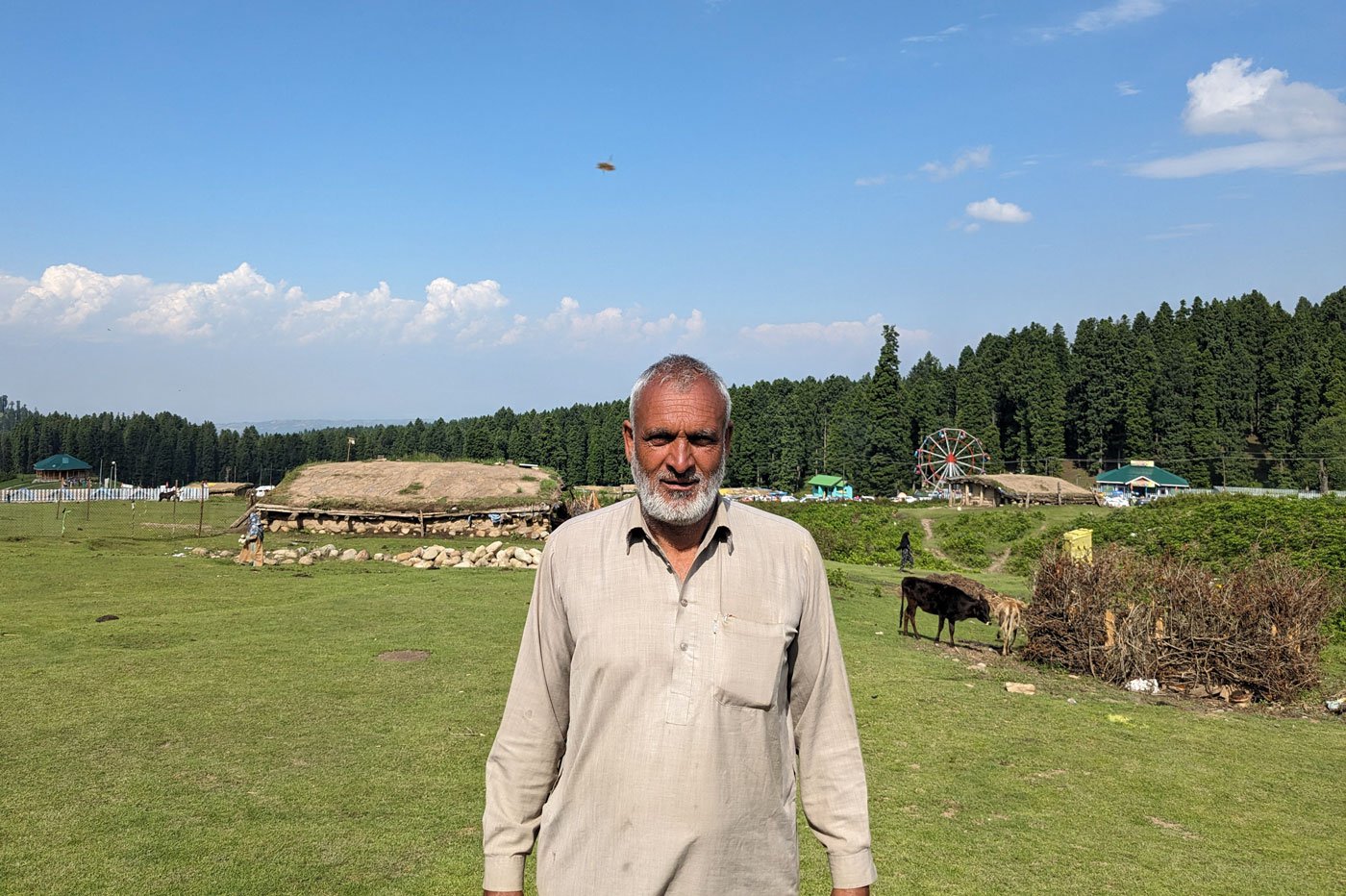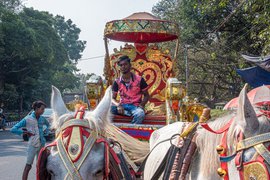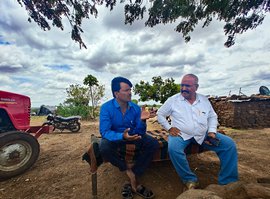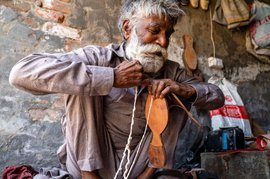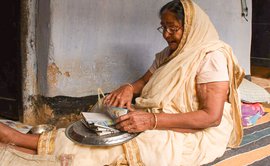Gujjar pastoralist Abdul Rashid Sheikh has been filing RTI (Right to Information) petitions on issues ranging from the distribution of ration to lack of transparency on how state funds are used. The 50-year-old pastoralist, who moves annually with his herd of over 50 sheep and around 20 goats across the Himalayas in Kashmir, has filed over two dozen RTIs in the last decade.
“Earlier, [official] people were unaware of the schemes that were introduced, and we were unaware of our rights,” points out Abdul, standing outside his kotha (traditional house made with mud, stone and wood) in Doodhpathri where he and his family migrate every summer. They come up from their village Mujpathri in the Khansahib block of Badgam district.
“Filing RTIs had a big role in making people aware about the laws and our rights; we also learnt how to deal with officials,” Abdul adds. Initially officials themselves were not aware of the RTI Act and, “would often be astonished when they were asked to provide information about relevant schemes and fund distribution.”
Challenging the process led to harassment of the people in the village – false FIRs (First Information Reports) were filed by the police in collusion with block officials. Informed citizens like Abdul, who play an important role in the RTI movement here, were targeted.
“It was the officials who were corrupt. Look at
their properties now,” he says to enforce his point. In addition to filing
RTIs, Abdul also raised the demand for issuing ration cards for around 50
people in Mujpathri from the Department of Food, Civil Supplies and Consumer
Affairs (Department of FCSCA).


Left: Traditional Kashmiri mud houses in Doodhpathri. Popularly known as kotha or doko , these houses are built using wood, mud, stones, tarpaulin and leaves. This is one of the bigger kothas that takes around 10–15 days to build. Right: A chopan whistles and moves the herd of sheep towards the higher mountains for fresh pastures

Abdul Rashid Sheikh outside his house in Doodhpathri: 'To build our kotha , we don't cut trees. We only use those that have fallen down during storms'
A pastoralist who relies on accessibility to common grazing grounds, Abdul is especially focussed on the The Scheduled Tribes and other Forest Dwellers (Recognition of Forest Rights) Act , 2006 . “If we leave the forests to the forest department, then there will be no forests left to save,” he says. Abdul has filed RTIs on the rights of Gujjar and Bakarwal pastoralist communities over forest land with the support of the Jammu and Kashmir Forest Rights Coalition, a local group working on securing community forest rights under FRA.
The gram sabha of Mujpathri formed a Forest Protection Committee (FRC) in 2022 and maintains a system of rules and regulations such as identifying patches of grazing and demarcating individual lands which can be reviewed every year. On April 28, 2023, it passed a resolution declaring 1,000 square kilometres of their forest as Community Forest Resource (CFR) under the Forest Rights Act (2006).
“The forest is for everyone. Me, my children and you. If we combine livelihoods with conservation, then the new generation will benefit. And if we deforest, then what are we leaving behind!” Abdul says, unhappy with the slow progress of Mujpathri’s CFR title.
The FRA, 2006 was extended to Jammu and Kashmir by the Union government in 2020.
“Nobody knew about FRA until then,” Abdul says.
When access to the internet increased, awareness about various schemes and laws
also grew among the people in the valley. Abdul explains, “the internet has
also played a crucial role in making us aware about the various schemes and
policies that are launched in Delhi. Earlier, we didn’t get to know anything.”


Left:
Nazir Ahmed Dinda is the current sarpanch
of Mujpathri. He has filed several RTIs to learn about the distribution of
funds for health, water, construction of houses and more. Right: Dr. Shaikh Ghulam
Rasool (left) and a resident of Mujpathri (right) discussing their claim submitted by the Forest Rights
Committee (FRC) of the village
In 2006, Abdul and some of the other residents of Mujpathri, including the current sarpanch Nazir Ahmed Dinda, met Dr. Shaikh Ghulam Rasool, Chairperson of J&K Forest Rights Coalition and the Area Medical Officer of Badgam at the time. He would often visit the village for work and played a crucial role in initiating the RTI movement in this area. “Dr. Shaikh discussed the laws and policies and the need for us to know more [about them],” says Abdul.
This led to more enquiries by the villagers into other schemes and, “Gradually we became aware of the RTI Act and the process of filing it. Many people in our village started filing RTIs and it became a movement,” explains Abdul.
In a conversation with him in Mujpathri, Dr. Shaikh recalls the initial days of holding meetings with the villagers and planning future steps. “The MLA in power was corrupt and the schemes did not reach the people,” he says. “Often the villagers would be harrassed by the police and there was no awareness about their rights.”
The first RTI was filed in 2006 by Peer G. H.
Mohidin, a resident of Mujpathri, to learn about the Indira Awaas Yojana (IAY)
scheme for public housing for the historically marginalised by giving a lump
sum financial assistance. Sarpanch Nazir followed up with another RTI in 2013
seeking information about the beneficiaries of Indira Awas Yojana (IAY).


Left: Nazir and Salima Sheikh light up the chulha (stove) and prepare for dinner inside their kotha . Right: Salima Sheikh preparing noon chai (a traditional Kashmiri drink of green tea leaves, baking soda and salt) and rotis
After the dialogues and discussions in the village, Nazir realised the need to conserve forests and seek transparency, leading to the filing of RTIs. “We needed to know the government policies for us and how we can access them,” he says. “Till 2006, we used to steal wood and non-timber forest products (NTFPs) like guchhies and dhoop along with herbs, roots and tubers from the forests because there were no other livelihood options,” says the 45-year-old Gujjar. “Around 2009, I set up a shop in Doodhpathri and started selling tea and kulchas in order to reduce the dependency on forests,” he continues. As we trek towards higher pastures along the Shaliganga river with him, he lists out the different RTIs he had filed over the years.
In 2013, Nazir filed an RTI asking the Department of FCSCA about the differential allocation of rice under the Public Distribution System (PDS). Additionally, he has also filed RTIs to learn about the students who have received scholarships under the Samagra Shiksha scheme launched by the Union government in 2018.
As we trek with Nazir along the Shaliganga river, we spot some tents in the distance and are invited for a cup of noon chai . Here, we meet Mohammed Younus, a Bakarwal herder who came up to Doodhpatri in April from Rajouri district in Jammu division and will stay here until October so that his livestock, that includes over 40 sheep and around 30 goats, can graze.
“Today, we are here,” he says, “But after 10
days, we will have to move upwards where there will be fresh pastures.” The
50-year-old belongs to the Bakarwal community and has been migrating regularly
to Kashmir since he was a child.

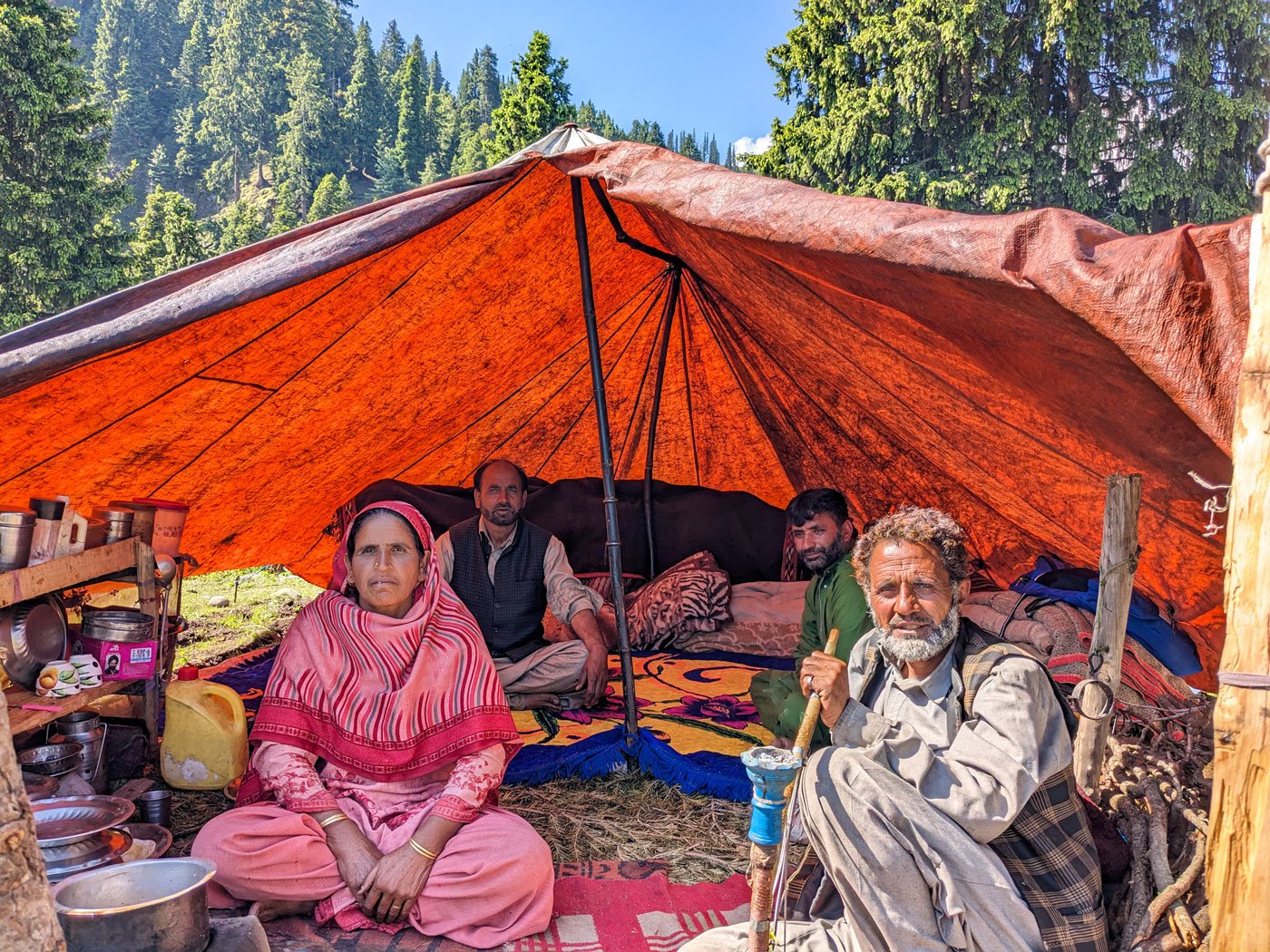
Mohammed Younus (left) on the banks of the Shaliganga river in Doodhpathri where he and his family have come with their livestock. They will continue to move upstream till the source of the river in search of fresh pastures. Inside their tent, (in the front) his spouse Zubeda Begam and his brother (with the hookah)
“On an average, selling a goat or sheep will fetch us 8,000 to 10,000 [rupees]. How can we survive the month with this much?” Younus asks, referring to the price of tea and oil here in J&K which is around Rs. 600–700 per kilo and Rs. 125 per litre respectively.
Poor implementation of the PDS has resulted in Younus and other members of his community not receiving parts of the ration. “Government is supposed to give us rice, wheat and sugar under the PDS, but we don’t get anything,” Younus says.
“For the first time, we received a taxi service this year that dropped us off at Yusmarg and our children came with the livestock,” says Younus. The scheme, he says, has been in effect since 2019, but it has taken four years to reach the Bakarwals from Rajouri. There is also a provision for mobile schools but they are barely functional. “They give us mobile schools, but there need to be at least 10-15 chulhas [households] and only then will there be a [school] master,” Younus says.
“There is every scheme on paper, but nothing reaches us,” he exclaims in disappointment.
